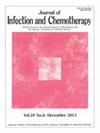Blood culture bottles for culturing cerebrospinal fluid in cases of bacterial meningitis caused by Enterococcus faecalis: A case report
IF 1.9
4区 医学
Q3 INFECTIOUS DISEASES
引用次数: 0
Abstract
Pathogen identification is essential for the treatment of bacterial meningitis. However, cerebrospinal fluid (CSF) culture tests are often negative when antimicrobial agents are administered before CSF is collected. Therefore, it is necessary to improve the culturing process for such samples. Here, we report a case of bacterial meningitis where the causative bacteria were detected by inoculating that patient's CSF samples into blood culture bottles. A 52-year-old man developed a fever and headache after undergoing transnasal transsphenoidal surgery for a nonfunctioning pituitary neuroendocrine tumor. He was suspected of having a wound infection, for which he was treated with cefozopran and vancomycin. A CSF test was also performed, owing to persistent fever, and bacterial meningitis was suspected. Although conventional CSF culture tests were negative, CSF cultures using blood culture bottles detected Enterococcus faecalis. The antimicrobial agents were therefore changed to ampicillin and gentamicin, after which the patient's meningitis improved. The blood culture bottles used contained adsorbed polymer beads with antimicrobial neutralizing properties, which likely contributed to the isolation of the bacteria. In addition to conventional cultures, ones done in blood culture bottles may be useful for diagnosing bacterial meningitis via CSF samples—particularly in cases where antimicrobial agents have already been administered.
粪肠球菌引起的细菌性脑膜炎病例中用于脑脊液培养的血培养瓶:病例报告°。
病原体鉴定对于治疗细菌性脑膜炎至关重要。然而,如果在采集脑脊液前使用了抗菌药物,脑脊液培养试验往往会出现阴性结果。因此,有必要改进此类样本的培养过程。在此,我们报告了一例细菌性脑膜炎病例,通过将该患者的 CSF 样品接种到血培养瓶中,检测出了致病菌。一名 52 岁的男子因患无功能垂体神经内分泌肿瘤而接受了经鼻腔经蝶手术,术后出现发热和头痛。他被怀疑伤口感染,因此接受了头孢唑仑和万古霉素治疗。由于持续发烧,他还进行了脑脊液检查,怀疑是细菌性脑膜炎。虽然传统的脑脊液培养检测结果为阴性,但使用血液培养瓶进行的脑脊液培养检测出了粪肠球菌。因此,抗菌药物改为氨苄西林和庆大霉素,之后患者的脑膜炎得到了改善。使用的血液培养瓶中含有具有抗菌中和特性的吸附聚合物珠,这可能是分离出细菌的原因之一。除了传统的培养外,在血培养瓶中进行的培养可能有助于通过脑脊液样本诊断细菌性脑膜炎--尤其是在已经使用抗菌药物的情况下。
本文章由计算机程序翻译,如有差异,请以英文原文为准。
求助全文
约1分钟内获得全文
求助全文
来源期刊

Journal of Infection and Chemotherapy
INFECTIOUS DISEASES-PHARMACOLOGY & PHARMACY
CiteScore
4.10
自引率
4.50%
发文量
303
审稿时长
47 days
期刊介绍:
The Journal of Infection and Chemotherapy (JIC) — official journal of the Japanese Society of Chemotherapy and The Japanese Association for Infectious Diseases — welcomes original papers, laboratory or clinical, as well as case reports, notes, committee reports, surveillance and guidelines from all parts of the world on all aspects of chemotherapy, covering the pathogenesis, diagnosis, treatment, and control of infection, including treatment with anticancer drugs. Experimental studies on animal models and pharmacokinetics, and reports on epidemiology and clinical trials are particularly welcome.
 求助内容:
求助内容: 应助结果提醒方式:
应助结果提醒方式:


